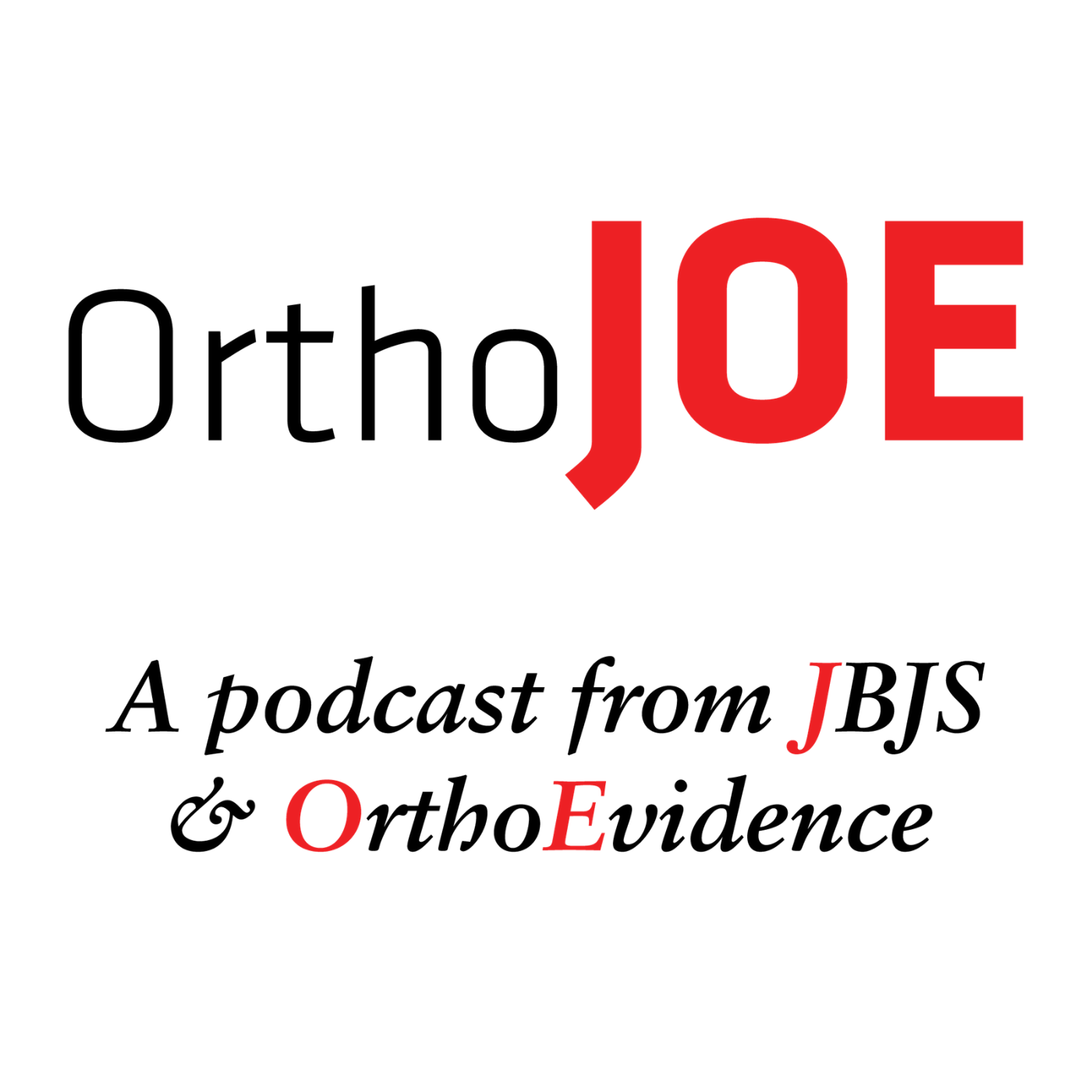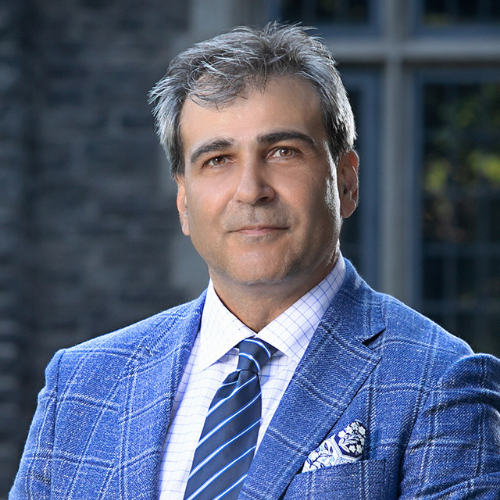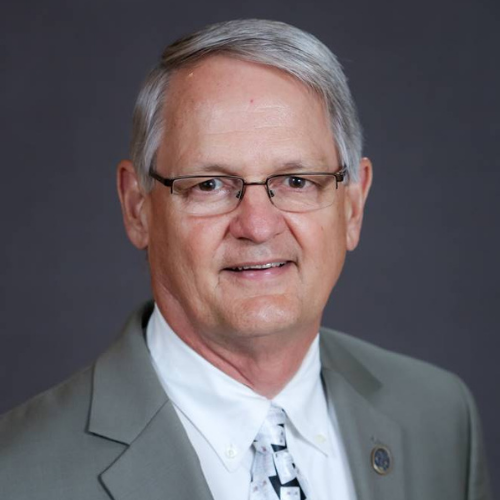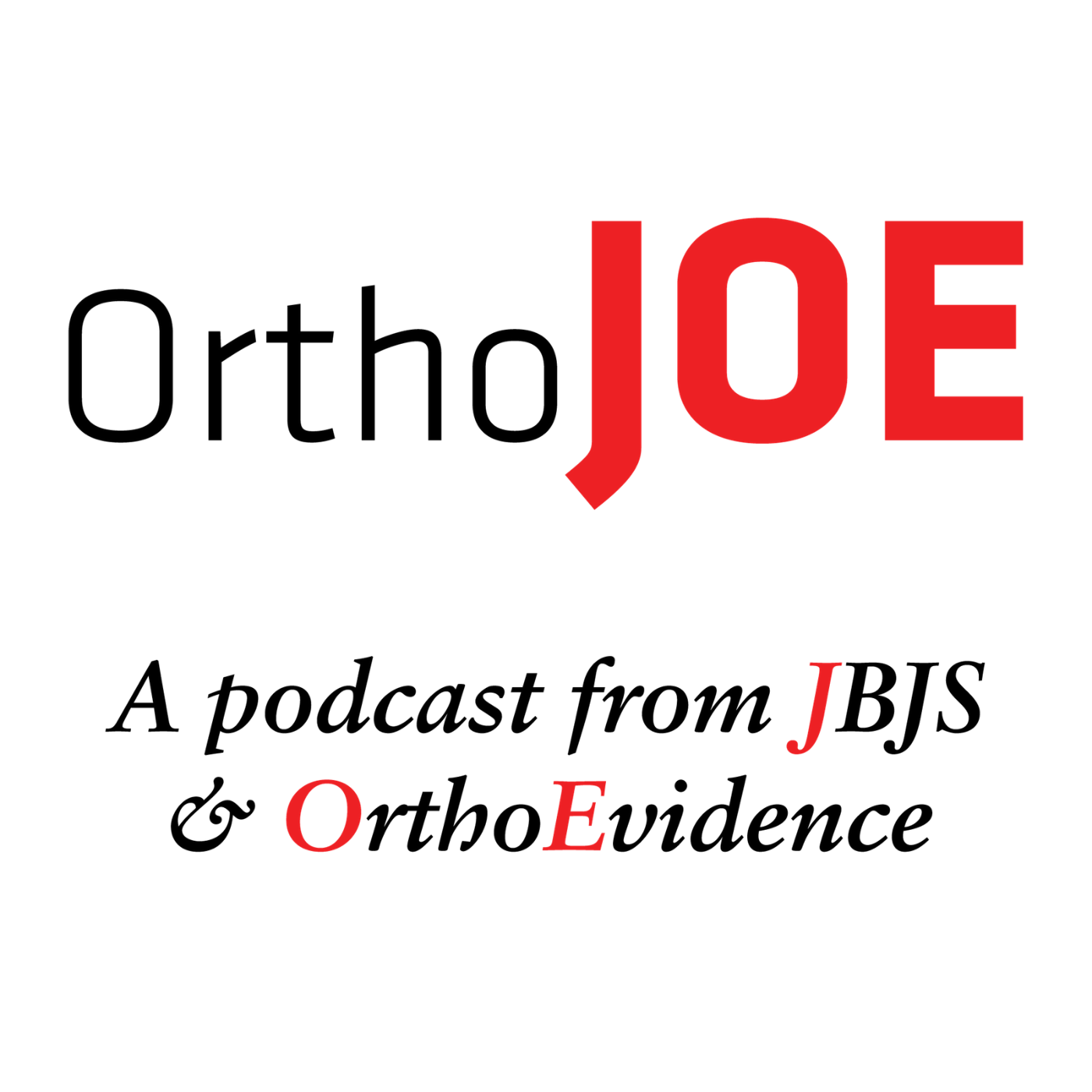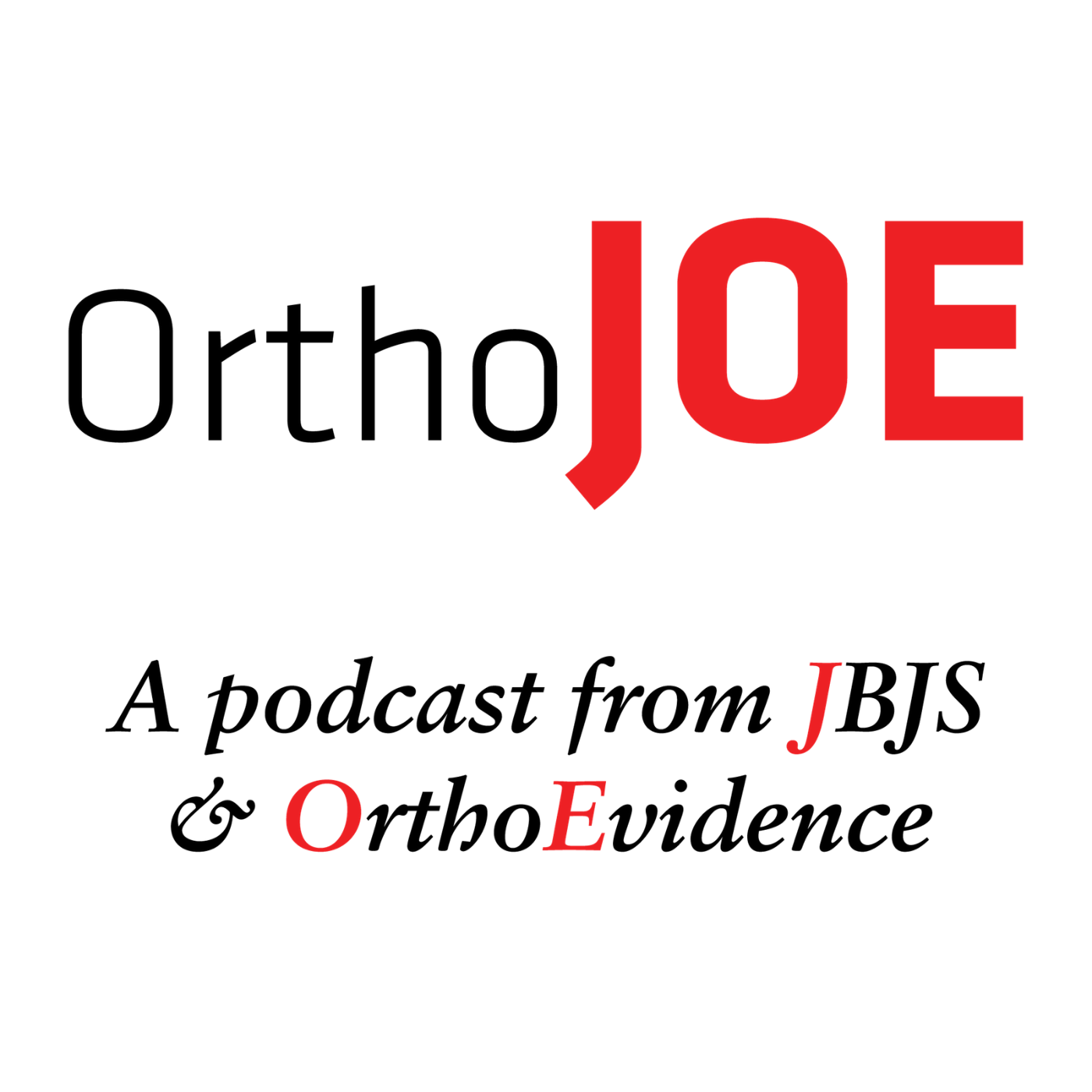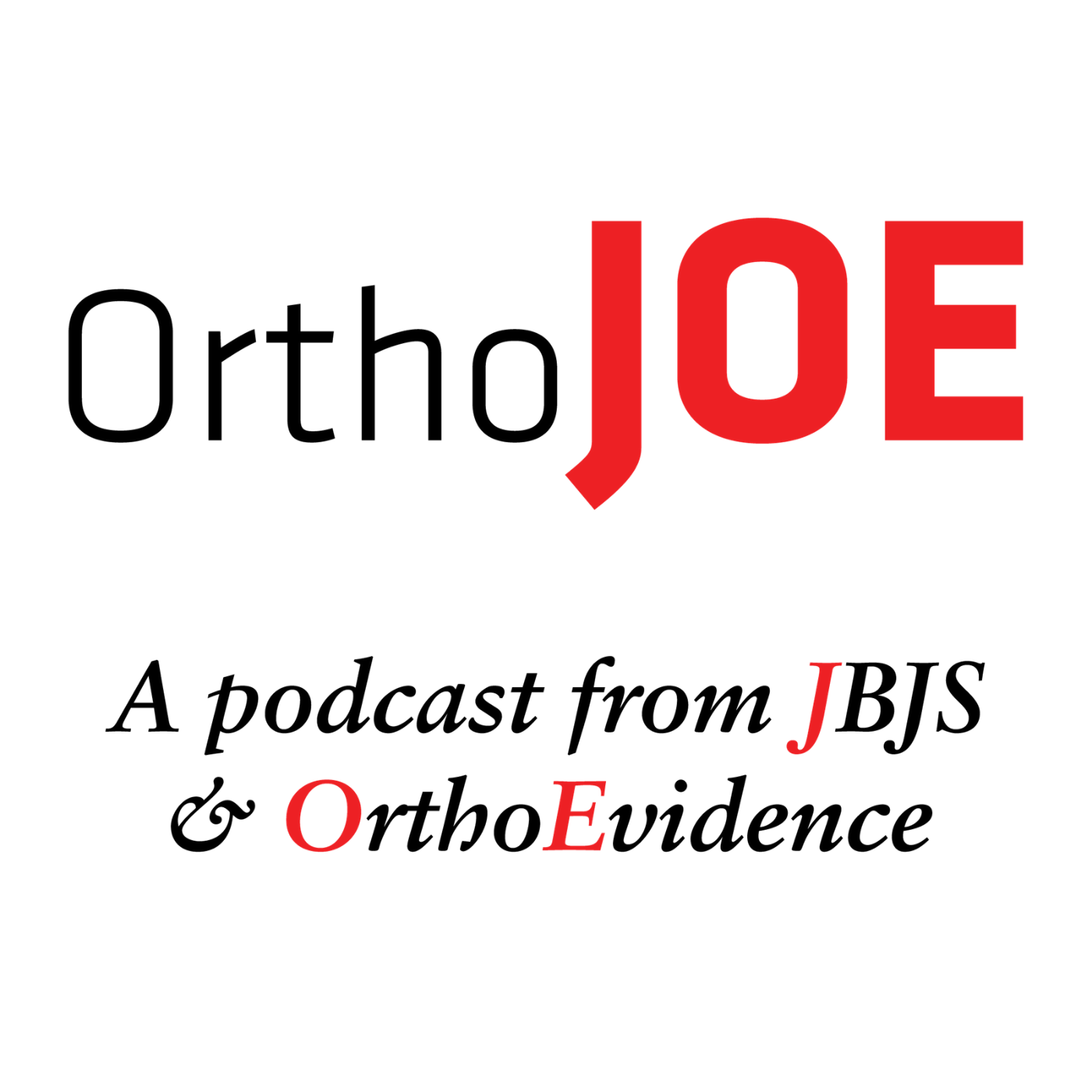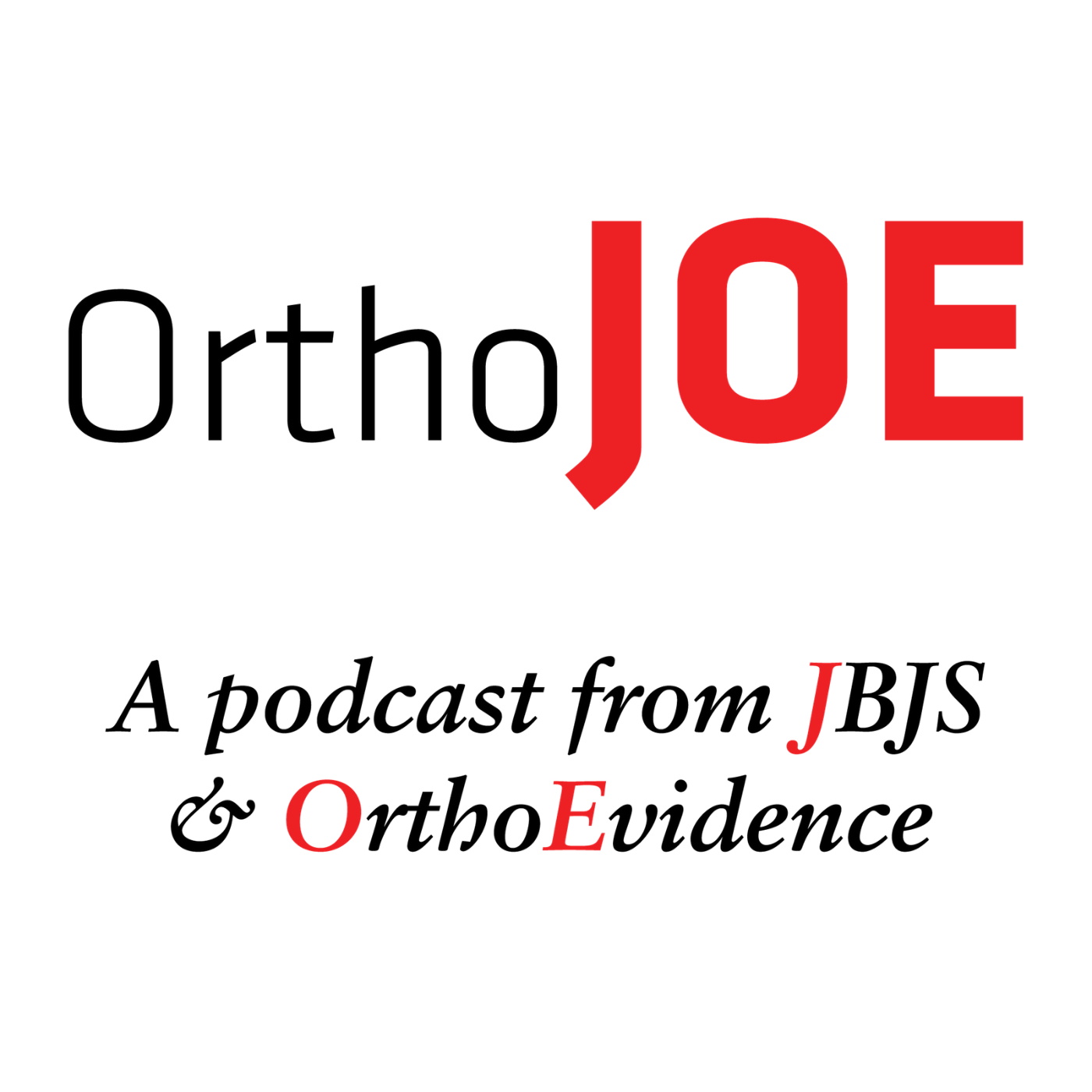Episode Transcript
[00:00:03] Speaker A: Welcome to the Ortho Joe Podcast, a joint production of the Journal of Bone and Joint Surgery and Ortho Evidence.
Join hosts Mohit Bhandari and Mark Swankowski as they discuss current topics and publications in the world of orthopedics and beyond.
[00:00:19] Speaker B: Morning, Mark. How are you? Nice. Monday. Monday morning. Yeah, I've got something interesting. So Tim Hortons at McGowan McMaster in Canada has gone back to their vintage cups. They're doing a historical 1965 onward. So they've been serving great coffee since 1965. Just put it out there.
[00:00:40] Speaker A: That's incredible. Well, I have to tell you, Mo, I am sitting in Seattle and it's six in the morning and the only cup I have has pens and scissors and stuff in it.
[00:00:54] Speaker B: I think you need the coffee more than me.
But I digress. Today, actually, Mark, we're going to be chatting with someone known to both of us, Dr. Antonia Chen, who is the professor and chair of the Department of Orthopedics at UT Southwestern. And she's been a part of the Journal for quite some time. And first of all, welcome, Antonia, and thank you so much for taking a bit of time. This is about you today. This is all about you. We're going to hear about you and all the cool things that you do.
[00:01:22] Speaker C: Well, thank you. I'm honored to be here. What I'm sad about is I don't have a Dunkin Donuts or a Wawas coffee cup because that would really complement what's going on right now.
[00:01:32] Speaker B: Absolutely. But you will get a cup. You must have lots of cups that have JB Jazz on it. But Ortho Joe, we'll get you.
[00:01:39] Speaker C: There's AN ORTHO JOE 1. There's a your cases on hold one. I've got lots of JB JS, the complement of JBJS series. We have, you know, complement of journals. We have a complement of cups too.
[00:01:49] Speaker B: Absolutely. Well, maybe I'll just start shirts and swag. Yeah, Mark, I'll just start off by just introducing everyone that. And they may. They probably already know through some of the communications we've had at the Journal. But Antonia is now serving as an executive editor within the Journal of Bone and Joint Surgery Family. And in that role, there's a few of us who are working together towards strategy. So it's a new role in the journal and we're really, really proud to have her part as an active member. So welcome to that role, Antonio. But I'm sure people are probably curious a little bit, you know, just your history so maybe you can. I'm sure you've done this lots or you've had lots of bios given of you. What would that bio say? If someone's introducing you?
[00:02:33] Speaker C: You know, I'm going to do it probably in the context of JB js I'll be honest. So, you know, I started as a fledgling resident at the University of Pittsburgh. And while I was there, one of the attendings said, hey, can you do a review for me? And it was for JB js. And I said, sure. You know, I love to learn to process editorial. I want to publish. So this is obviously a very eye opening area. And to this day I say I am, I am today because of reviews. That's truly the cornerstone of the backbone of why I am where I am today. I started with reviews, reviewing under someone else's name and then reviewing under my own name. And you know, your name's on the line. You should see my first reviews. They were like four pages long, right? I was like, put a period here, put a comment here. Like I was copy editing. And that's not really what a review process is about. But I didn't really understand that as a resident. So, you know, fast forward to fellowship at the Rothman Institute and then stayed on as an attending at Rothman. Throughout that process, I just kept doing more and more reviews. And it started off as, you know, case connector reviews, right? So it can make a nice small niche. And then I went in bigger and I kept asking, I was like, well, you know, now that I feel comfortable in this area, is it possible to do other? So I did, you know, Essentials Surgical technique. I have a login to many different journals of JBJs, you know, Essentials, you know, technology, surgical techniques and reviews as well too, to JBGs reviews and then went to the JBGs flagship as a reviewer. And I got to do a lot of those. And you guys have an amazing program, the Elite Reviewers program. And I was recognized as an elite reviewer. And I was like, this is really fantastic. And that made me keep wanting to want to keep going, right? I wanted to keep reviewing. And I realized that as I was reviewing, my own writing became better, right? I became more critical of it. I became more critical about reading. And I hope my publications became better because I was writing so critically for other people. I was also reading critically for mine. So it really helped develop my own personal research career.
Then people took note of this, I guess, and Dr. Santowski said, hey, why don't you come aboard and be deputy editor? For adult reconstruction. That was huge because now I understood a totally different part of the editorial process, understood how papers got reviewed, assigning the reviews and then reading them and understanding what the publication process was and everything like that. Then I got a call from Dr. Bhandari saying, hey, we're doing something different. And I applied for the role, and it was super competitive. And I'm truly honored to be a part of a group of executive editors who now not go from just selecting the articles, but also developing the strategy of the journal. So I've had a long history with JB JS and I'm super proud of it, and I'm just thankful that you guys took a chance on me. And as part of that, throw in the area here, you know, how can we disseminate information? Part of the strategy, and one of those was through podcasts like this. And the podcast, I will tell you, you know, listening to Ortho Joe, it's. It's enlightening. It's, it's riveting. It's, you know, when we're driving different places, we can listen to it. But even just, you know, in. Just learning about things in small snippets has been nice. So Dr. Schoenfeld and I have been able to do that with your cases on hold. And I have to admit, it's good for me because it makes me look at all the different articles and select what we're going to do and also say, get feedback from people who are listening, say, hey, I wish you would do this, or I hope you would do this, or hey, you said this about my article. This is what I think too. So it's actually stimulated dialogue outside of the podcast. That's been really interesting as well. So it's been a fun journey, for sure.
[00:05:44] Speaker A: Antonio, I want to thank you because you have just given our listening audience the answer to the question, which I have had many, many times, is how did you get to be where you are with the journal? And the answer is, you start with reviews, you do them on time, and you do a really, really in depth good job. And it goes from there. And so thank you for that wonderful roadmap for anybody interested in continuing to move up in the publishing world.
[00:06:14] Speaker C: It's been really fun. I appreciate it and you recognized it, which I also appreciate it too. One thing I tell people to do, to do a really, really good job reviewing, stay on time, everything.
Also ask for opportunities. And sometimes those opportunities will arise and sometimes they won't. And you've recognized that. So I really Appreciate that.
[00:06:30] Speaker B: Can I ask. So obviously that's, it's an amazing, it's amazing history, and clearly it goes to your dedication and effort and skills. What got you interested in orthopedics in the first place?
[00:06:40] Speaker C: ANTONIA so when I first started medical school, I was going to be a pediatrician. I liked kids, I liked working with kids. So pediatrician just made sense. And as I started in medical school, two things became very apparent. One, a lot of times when you're with kids, it's more sleep well, baby visits. And if a kid cries because it hurts, he can't actually identify what it is. And the parents are also hard to work with. There's no doubt about that. So I said, maybe I want to try something else. But when I was a first year medical student, one of the orthopedic surgeons came in and taught us the hand. And that was unusual in our anatomy classes. Most of them were taught by PhDs who are an anatomist and things like that. But this orthopedic surgeon was so passionate about the hand that he actually took an afternoon off and walked us through the hand. And we were being, I'd say, stupid medical students, we pull on something and a certain part of the hand moves, and it was like, oh, that's kind of neat. So I say it's form meets function. So I wasn't thinking surgery at that point in time, in all honesty, but I thought that this person was really, really interested in what he did. Ironically, I don't really love the hand anymore, but at the time I thought that was neat. So between my first and second year of medical school, we always have to do research.
And I happened to work with someone who did knee replacements, and I saw patients go from not walking to walking. And that was really the spark for me. And I realized my personality is not one of those who's really good at waiting for hypertension to get better over decades, right? Or, you know, working on that. I wanted immediate, and that's why I think I like reviews, right? Because you do a review and you get an immediate result from that. And the same was true in orthopedic surgery. So that's how I got into it. And I've stuck with the joint replacements because I really enjoy seeing the gift of mobility come to fruition.
[00:08:12] Speaker B: Did you have a individual or someone that you say, okay, this individual, I mean, I'll use the word mentor. It's used a lot. But somebody who, for you, you go back and say, if it wasn't for him or her, I probably Wouldn't have done the things I've done.
[00:08:26] Speaker C: Oh, that's a hard one.
[00:08:27] Speaker B: And by the way, I always say it's always hard to name one person. So if there's a number of people or if you prefer to leave them all anonymous, that's fine, too. It's just more just getting a sense. Usually there's people that you go to, right? And you probably still go to.
[00:08:40] Speaker C: There's always people, I think. And I think the really neat thing about the word mentor is that it's not a mentor for just one thing, Right. It's a mentor for multiple different steps in my own career right now. And sometimes mentorship takes the form of you talking to them and sometimes just taking the form of emulating them. Right. And saying, hey, I see what they do, really appreciate what they do and want to be like them. So my first mentor was the one, my Knee Replacement surgeon, Dr. Fred Tria, Freddy Tria, who did knee replacements. And he's the one who said, you know, you can do this, you know, And I think as a woman in orthopedics, as someone who wasn't sure I was going to go into orthopedics, and this guy says, you can do it. That was a big game changer just for entering the field of orthopedics. And he was also publishing, and he was like, you should get on the podium, you should do these sorts of things. And that wasn't even a thought in my mind at that time as a medical student. So that was probably the biggest impact in residency itself, I would say. There's two mentors. You always kind of follow your stages. Dr. Brian Klatt, he was also a joint replacement surgeon who believed in me. Let me present at Aukis as a resident. And that's a very daunting stage. You know, you have 4,000 people on you, all eyes on you, and they are very critical about what you say. But gave me my first opportunities, which is great. Dr. Jim Kang, he was actually a spine guy. I almost went into spine. I was between spine and joints, and so I did a bunch of research in spine, but he really did formulate that and push things forward. And Fredd Fu was just someone everyone knew, and you had to really want to emulate what he did and how he did it. Right. He was just such a fort of nature, really, you know, transformed sports medicine, the research behind it and things like that. And I felt very similar about that when I went to the rothman Institute with Dr. Dick Rothman. He understood the business side and the Research side, he was one of the few early privateemics, right, where he said private practice. But we still understand the importance of academics and of teaching and things like that. So I really learned a lot from that area. Dr. Jay Parvizi, of course, is the king of infection. And I fell in love with infection as a third year resident and I met Jay Parvizi and I go, oh my gosh, that's the Jay Parvizi. Right? And so once you do that, you can't turn and go back because that's just where things are. And then I end up going to Brigham next and followed Jim Kang. So that's where mentorship was actually to another level. Right. Like, not only was he my mentor, now he's my boss, but believed in me, encouraged me and really pushed me along. So those are probably my biggest mentors in the field of orthopedics in that realm. I think the other side of things are our extracurriculars, which sometimes take more time, in all honesty, Aukis being one of them, the American association of Hip and Knee Surgeons.
And then in that group of people, someone who really encouraged me, Dr. Audrey Tsao. She first believed in me and made me part of the membership committee as a resident, which was not usual. She's also just been a mentor. She's another woman in archiplasty, happens to be Asian, was in the academic setting, all sorts of things like that. So that's been an incredible one.
And just by emulation, I just keep watching him, Dr. Mark Swintowski, because he was editor and chief of JBGs, believed in me and made sure I did things. And I know I'm on the podcast now, but I'd have to give both of you a shout out. Dr. Bhandari as well too. You've done this whole changing, transforming research in orthopedics and that's what I aspire to do next. So I've been doing a lot of research along the ways, but these truly transformative big research projects have been really incredible. So I've been lucky. I've been surrounded by a lot of amazing people in orthopedics.
One other person I will shout out to in the world of AHKS is Dr. Brian Springer. He has been a mentor throughout as well too. And really just, you know, always this person I can call no matter what. And it's been fun because we. He took a chair position not long before I took a chair position. So we've been kind of on this journey together. So, you know, kind of now we're peers, but he's always been someone I've looked up to. So it's been. I've been really lucky on this orthopedic journey. It's not just one person that has really made this a pretty incredible trip.
[00:12:21] Speaker A: I heard your mention of your pathway and in some ways you're still on the leading edge of the advancement of women in orthopedics. And that's something that specialty has needed since we established orthopedics. Can you just give our audience your assessment of where our field is in this important endeavor?
[00:12:45] Speaker C: So I will say I am very proud of what's happened over the field of orthopedics. Now people say we are 7% women and also specialties, but that's a huge jump from 4% only about 10 years ago. Right. So over the last 10 years, there's actually been a huge increase in the number of women in orthopedics. And I think it's based on a few things.
One is mentorship, right? So, you know, being able to see someone who looks like you and being like you, like when I saw Audrey, for example, that was really enlightening to me. Right. I'm a third year resident. I'm interested in orthopedic, I'm interested in arthroplasty. Now, whether or not I can do it, I don't know. But I go to this meeting and now I see someone who looks like me, you know, understands me, things like that. And she's not the only one. There's other there. But I will say that older generation, they've broken through the glass ceiling, right? They were the pioneers. They were the only residents in their only female resident in their area and things like that. And they've, you know, banded together and come together. I'm part of a group called Women Orthopedic Global Outreach, which is a group of female art, female surgeons who do arthoplasty. And that's an unusual thing. Most of the other Operation Walk groups are regionally based. We are based on the fact that we are all women in arthroplasty or do arthroplasty, which is really cool.
But mentorship is one thing, so more and more women going into the field can help support it. I'm a huge supporter of women supporting other women, and not just women either. I support medical students and residents and, you know, fellows of all different backgrounds. But, you know, women supporting women is a really, really big thing. And then three, I think the biggest thing is open dialogue. I think that's something that wasn't the case in the past, when it comes to things like struggling with residency, that's hard for everyone. It's not just for women or men. Right. Fertility issues. Those are things that never are really discussed. Work, life, balance or family or whatever you want to call that term, or you want to do life and you want to do work. What does that look like? And there's these forums, like, we have a forum for women orthopedics on Facebook.
And that's been really good because if people can post anonymously, they want to say something. You know, I'm really struggling with this. What would you guys recommend? And people jump on board and help each other. Some people even say, like, hey, I need a job. And there you go. You have women jumping on there and saying, here, let me talk to this person and talk to this person and get that happen. Or I'm struggling with this because my practice says I'm doing a really bad job. What do I do about that? So just being able to be honest with each other. I think what happens is, you know, people see other people's lives and again, this is not just for women, but say they have everything figured out, everything's great. There's no problems at all. And the answer is no. We all struggle with something. And so in the field of women orthopedics, it's been really something that's elevated that to make it it's okay to be an orthopedic surgeon and have problems and work through with it.
[00:15:15] Speaker A: So you did a great job with that summary. I'm going to move it up a notch. You're a chair now.
How are you going to approach our fields? Issue with underrepresented minorities in our field.
[00:15:28] Speaker C: Right. And that's one of the other areas that we've worked on. The woman piece that is taking off, which is great. Underrepresented minority is a hardest is a harder one because of multiple different factors that I think affect it. One same thing as mentorship. Right. So encouraging more and more people to go into it so that people look like them, look, feeling them. So I really like nth dimension, gladden society, things like that. I'm a member of those because I think it's actually very important to support people in that part of it is also just giving the belief that they can do it. So I was going to say something about women is like, you're not strong enough. If you want babies, you can't do this. Same with underrepresented minorities. Right. They're not told that, oh, you know, you should consider, you should, you should be an orthopedic surgeon. You should do it. Not just mentorship wise, but like you're smart enough to do so, you're strong enough to do so, you have the means to do so. And that's the third one where I think financial could be an issue or opportunity. And I think opportunity is what I can do as a chair. Right. For example, bringing in people to do research. Right. Because you do research, you get to know them, them, you're more likely to bring them on board.
Opportunity to say, hey, look, put a saw in your hand, see what it feels like. See if you enjoy that process because you may not have getting that encouragement beforehand. So I think those are the areas and one other area too that I would love to do is for sub eyes. It's an incredibly expensive endeavor applying for a residency as well as expensive. So can we create programs where we say you apply for a scholarship and then all of a sudden doing a sub place is free and you don't have to worry about that. It'll cover your travel, it'll cover your logic, experience. Those are hard to do. And that's not just for underrepresented minority, that's for a lot of medical students. And if you can't do that and you demonstrate need, then that's something we can take that one barrier out. I love the idea of, you know, when you talk about equity, you know, it's not just saying, giving everyone the same opportunity by saying, okay, we're going to open up this door and let everyone do it. Well, for some people, you know, you just need one step. Well, some people need three steps to get to the exact same level. So you can see over a fence, for example. And so how do we do that and tell the different people saying, you know, each individual is different. And so can we say, can we give you those three steps so you can see at the same level of defense as someone who only needs one step to do so.
[00:17:27] Speaker A: That's a great summary, thanks very much.
[00:17:30] Speaker B: And maybe as a last point, there's going to be lots of folks, Antonia, who know you and then there'll be some who don't, who listen, who have read your papers, who hear about you think, my goodness, all she does is work, work, work. And here's your chance to tell them to say, no, no, work is really important, but I do have fun. So what does Antonia Chen do to have fun when she's not working?
[00:17:50] Speaker C: I'm laughing really hard because I'm like, fun. What's that it is funny when people meet me for the first time because they know me by my papers and like that. You're like, oh, you're normal.
I'm a human being. Like, I like people, I like hanging out, I like talking and stuff like that. So for fun, what I like to do is I would say pelotoning and biking. I have not biked on the roads of Texas, I have to admit, but biked in the more safe parks because driving here is a little bit crazy. I have to admit, coming from New Jersey and coming from Boston, Texas is actually crazy driving. But that's a whole nother discussion. So biking is probably my go to. I love hiking.
Hiking is a little harder in our state, so I go to other places and go hiking. My sister lives in California. Going to Colorado, just hiking is really fun. And I like to hike with my fiance and our four pound dog. As she gets older, it's a little harder for her to hike. But she did Acadia with me.
She can move.
So those are probably my go to things and just hanging out, spending time with my family, friends and our dog. So those are the things I like to do for fun. And I actually like to travel. That's the other last thing. I get to travel a lot for work, so that's really nice. But even just traveling for fun, I recently went on a trip with my best friend from medical school and we went to Norway and it was a random country. We said it's the summer, so it's hot over here. We want to go somewhere different. And there's not a lot of meetings in Norway. So we say, why don't we go to Norway? And we did. And we did a lot of hiking and we did a lot of, you know, being outdoors and some boating thing and just, it was really fun. So those are the things I like to do and experience new things.
[00:19:19] Speaker B: Well, there you go. So if you want a meeting with you, you just have to get you on a hike and maybe, maybe grab you a coffee. Right, Coffee and a hike. We're working and Dunkin Donuts. Right, whatever. That's awesome.
[00:19:29] Speaker A: Well, before, before we sign off, I want to get really personal here. Who is your favorite instructor on the peloton platform?
[00:19:37] Speaker C: You know, it's, it's a tough one. I, I've, I've cycled through multiple different. One, I think Matt Wilpers is still my go to, but Cody Rigsby is hilarious. So depending on my mood, if I'm in a serious biking mood where I'm like trying to, you know, train for something that's about Walpers, but end of a long day, I just want to veg out and just laugh.
[00:19:58] Speaker A: Cody Rigsby, great answer.
[00:20:02] Speaker B: I don't understand what you're talking about.
You take it to the forest and you pedal. And that's, that's, that's. That's the extent of my peloton, whatever you want to call it.
[00:20:10] Speaker C: Yeah, it's a different. It's a different language. You know, it's Canadian. U.S.
fair enough.
[00:20:15] Speaker B: Fair enough. Listen, Antonio, great having you here, and thank you so much for everything you're doing for Orthopedics and you thank certainly what you're doing for the journal. Have a great day.
[00:20:22] Speaker C: Thank you so much, guys, for having me.
